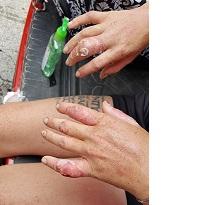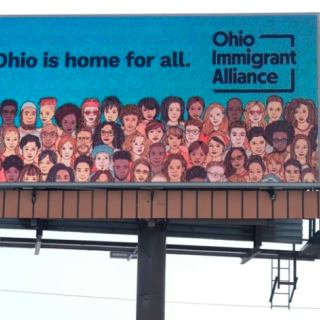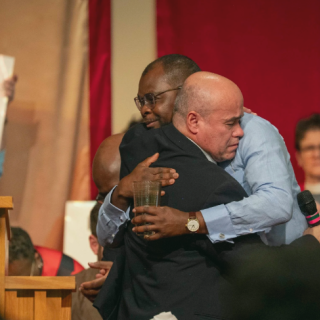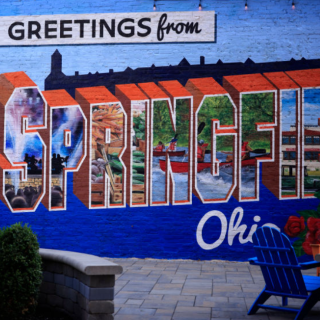Advertisement
Author Esther Flores is a registered nurse and the founder of 1DIVINELINE2HEALTH, a 501c3 public charity. Their mission is to eliminate human suffering locally and globally via compassionate messengers through a holistic approach. They are 100 percent solution-driven and community-funded. The organization is client-centered vs. system-centered. Seventy percent of their monetary donations go towards serving human trafficking victims and the remaining 30 percent goes towards loans, property taxes, insurance, maintenance and other costs. Flores is an abolitionist, with an addiction to love in the Columbus Jungle – a type of love that demands action and transparency. 1DIVINELINE2HEALTH defines compassion by using their human resilience as they meet hurting folks where they are at, never empty handed, which include the street outreach in a red commercial truck the victims call the “love bug.”
Nationally, Ohio ranks fourth in human trafficking and second for opiate overdose deaths mostly due to the major highways that link us to Canada, New York City, Michigan and other places. Human trafficking is a multifaceted problem in Columbus, however most public officials ignore or conceal it.
Human trafficking is “the recruitment, harboring, transportation, provision, or obtaining of a person for labor or services, through the use of force, fraud or coercion for the purpose of subjection to involuntary servitude, peonage, debt bondage or slavery. (22 U.S.C. § 7102(9)),” according to the United States Department of Justice.
At any age, a person can be exploited in different forms – by being forced into prostitution, labor, begging, criminality, domestic servitude, marriage and organ harvesting – while being drugged in the process. Every 30 seconds someone is trafficked and over 80 percent of them are girls and women used as sex slaves. As a result of human trafficking, over $150 billion is generated annually worldwide, including over $50 billion in the United States.
Public officials also ignore the trench workers who work directly with the victims in the epicenter of this human trafficking crisis, which is the West Side of Columbus.
In 2018, the National Human Trafficking Hotline reported 219 human trafficking cases in Ohio. During the same year, the 1DIVINELINE2HEALTH 4-hour Drop-In Center, a 501(c)3 nonprofit organization open only one night a week – served 1250 females, 12 transgender folks and 50 children on the West Side of Columbus.
Unless we expose the problem for what it is, how can we accept the four-letter word to be the solution? Love is the remedy for human and drug trafficking. Both victims in these two dark worlds operate in fear and isolation which leads to hopelessness and despair in their hurt due to the cruel treatment of their traffickers. Traffickers prey on victims through coercion and other sometimes brutal methods to keep them codependent. It is a special relationship when occasionally a victim develops a bond with the drug traffickers or their pimp, known as the “Stockholm Syndrome.” However, when love is present, it transforms a traumatized brain. The person’s faith overrides fear, love overrules hatred, and hope overturns discouragement.
At 1DIVINELINE2HEALTH, the “Love Tribe” is composed of trauma-trained, responsive and compassionate messengers from different walks of life who can relate to these victims. Most of the women and transgender folks they serve support their families and, sadly their addictions, through prostitution. But, at 1DIVINELINE2HEALTH we do not call them prostitutes. They are someone’s daughter or son. They are destitute folks who lack love and are in need of a safe place. Most of them are women we call our street sisters and we have become their foster family.
The street sisters on Sullivant Avenue are homeless and come from all over the United States. Many were kidnapped and introduced to opiates to increase their libido. The age group of human trafficking victims range from the unborn infant to a 68-year-old female. They come from different religions, gender orientations, socio-economic statuses and ethnic backgrounds. Many women are dropouts from court and recovery programs. They are runaways and aged-out kids from foster care. Some are even relatives of judges, officials, law enforcement, medical and other professionals. Biracial and Asian women are worth more on the streets. The trans-shes are prone much more to violence from Johns. In Ohio jails and prisons there are women who were groomed into prostitution in dog cages on Sullivant Avenue.
Currently, we know of five homeless pregnant females suffering from addiction, their situations fueling the area’s high infant mortality rate. The Hilltop’s infant mortality rate is 15.5 percent compared to 8.4 percent in Franklin County, seven percent at the state level and the 5.8 percent national rate. The numbers are worse when you look at specific ethnic groups. Only in Ohio’s capital does a baby kangaroo born in the Columbus zoo have a better life expectancy than a baby born on the Hilltop.
The victims have health conditions related to high-risk behaviors such as HIV, Hepatitis A, B, and C, MRSA+ wounds, sexually transmitted infections, and cancer. They struggle with mental illness such as depression and Post-Traumatic Syndrome. Those who grapple with agoraphobia have a difficult time getting help at hospitals, churches, institutionalized recovery places, prisons and any government offices.
Some of these trafficked women have been gang raped, beaten and tortured with cigarette burns and knives. Pimps have used bottles and other objects in their birth canals and taken their children away from them. Many girls go missing and their bodies could be in our landfills as their graveyards. Sometimes the dead are placed in abandoned vehicles and houses while others are left in dumpsters or trash bins. Some of the women have been violated and shot to death by cops, drug traffickers and other men.
On April 4, 2019 Andrew Mitchell, a 30-year veteran of the Columbus Police and its Vice Unit, was indicted for voluntary manslaughter in the murder of Donna Dalton on the West Side, also charged with falsification of documentation, exchanging sex for freedom and other federal charges. It has been over 20 years since a cop was convicted in this city and Columbus’ Vice Unit was abolished in the spring 2019.
Bobbie Simpson was a frequent visitor to our 4-hour Hilltop Drop-In Center. Last year she was partially dismembered and set ablaze in a container at Burbank Park located in Upper Arlington. Once again, Sullivant Avenue made the headlines. Brittany McDowell was another street sister who visited our Drop-In Center. She was discovered on July 4th this year at the Alum Creek State Park in a shallow grave. A cleaning company turned in the murderer, David Choe Bartholomew. There was too much blood on the backseat of his father’s car to be considered the blood of a squirrel, as Bartholomew had claimed.
Human trafficking victims, their children and transgender folks need a full-time Drop-In Center, but there is none available on the Hilltop or in Franklin County. Research on women’s drop-in center that are child-friendly and provide individualized care with peer support and focus groups have had positive outcomes. Their success in their community was attributed to having nonjudgmental staff meet the needs of women with high risk behaviors. Ayon’s 2018 AIDS Care study research showed prostitution, addiction, HIV, Hepatitis C and other type of infections dropped significantly. In our community the rate of MRSA+ wounds would decline if we could offer the services of infectious disease doctors and teach clean wound techniques.
A harm reduction approach is shown to contribute to good parenting skills, sobriety and empowerment, and can help women retain their children. Women overcome the stigma obtained from hospital health care workers that makes them feel worthless, develop low self-esteem and make them reluctant to seek addiction treatment. Furthermore, the studies showed that IV drug users depended on the commitment and dedication of service providers to deliver outreach services: counseling, Sexually Transmitted Infection (STIs) services, syringe exchange program (SEP) as well as education, training and skills programs to rehabilitate them to wholeness. There are multiple academic studies that agree with the above findings in both rural and urban areas in developing countries and in the United States.
Do you want to create a safe, healthy and loving community on the Hilltop? 1DIVINELINE2HEALTH needs monetary donations to renovate a kitchen into a food pantry and a bathroom into a decontamination and exam room. The cost of the project is $45,000. Help by making a monetary donation via PayPal by using our email: 1divineline2health@gmail.com or donate via website: https://1dl2h.org/. This method is more cost effective than any crowd funding sources. Please support our cause. Abraham Lincoln said, “The best way to predict the future is to create it.” Let us create the Drop-In Center in common unity through Love.




